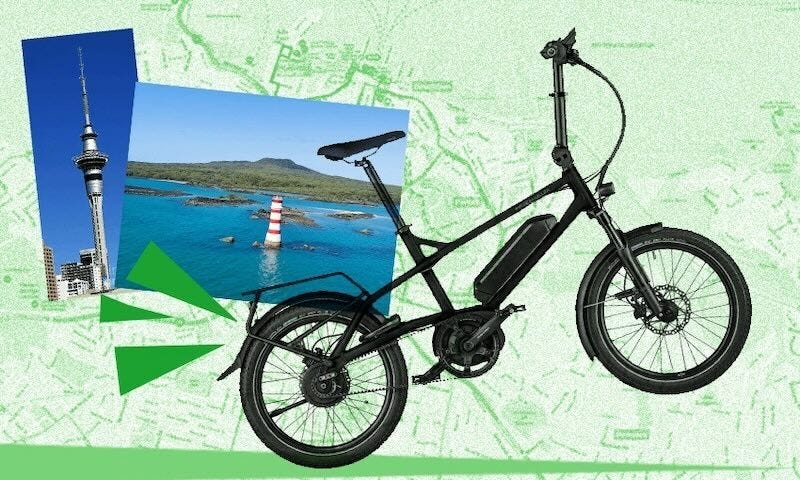Youth bear brunt of rising unemployment ahead of 'economist's Superbowl'
The Reserve Bank continues to face pressure to cut the OCR earlier, as economic pain continues and 33,000 more people find themselves unemployed
Mōrena, and welcome to The Bulletin for Thursday, August 8.
In today’s edition: government considers importing liquified natural gas as energy crunch gets crunchier; protest and court action over Māori wards; all the overnight action for New Zealand’s athlete at the Olympics; but first, a rate cut next week seems unlikely, but a signal of sooner-than-expected easing would be welcomed

Kiwibank’s chief economist, Jarrod Kerr, has always been adept at injecting pop-culture stylings and enthusiasm into otherwise dry economic news. In describing next week’s official cash rate announcement as “the economist’s Superbowl,” it’s safe to say he and his brethren might be alone in their very high levels of anticipation. However, pressure has been growing for the Reserve Bank (RBNZ) to move sooner rather than later on cutting the rate.
In May this year, the central bank’s Monetary Policy Committee suggested the OCR should be held at 5.50% until August next year and could even go up another 25 basis points. In July, economists predicted a November cut after what was described as a “dovish pivot” by the RBNZ. There’s been a bit of oscillation between calls and forecasts this week, but Kerr has been joined by BNZ economists in a more forceful call to cut the rate immediately. Calling for and predicting are two different things and as interest.co.nz’s Dan Brunskill reports, BNZ’s economists also noted that “stronger than expected labour data could prompt some traders to back away from predicting imminent interest rate cuts.”
Unemployment rate highest in three years but not as high as expected
That data arrived yesterday, and while it’s cold comfort to the 33,000 more New Zealanders who are jobless compared to this time last year, it was “stronger than expected”. The Herald’s Liam Dann runs through the numbers here. Many were predicting an unemployment rate of 4.7%, and it landed at 4.6%. That’s still in line with the RBNZ’s predictions, is up on last quarter’s 4.3% and is the highest it’s been in three years but as Dann notes (paywalled), ANZ senior economist Miles Workman said the “data is ‘no smoking gun’ for early cuts”. As BusinessDesk’s Rebecca Howard reports, before yesterday’s labour data was released by Stats NZ, a 92% chance of a 25-basis point cut to the OCR next week had been priced in. As of yesterday afternoon, it was 55%.
Concerns about lasting damage and ‘wage scarring’
Back to forecast vs. calls, most economists believe the RBNZ has done enough to curb inflation. While forecasts are suggesting October or November for the first rate cut, the calls are still for cuts ASAP. Next week’s Monetary Policy Statement will be scanned for signals that an easing is on its way. ASB’s Mark Smith says, “The labour market looks set to significantly weaken from here, and this could cause longer-term economic damage if the RBNZ maintains as much pressure on the monetary policy brakes as it does currently.” Kiwibank’s Kerr expects the rate to hit 5% by the end of the year. There is also concern about lag, with the impacts of a rate cut taking a while to filter through the economy. RNZ’s Susan Edmunds reports this morning on the impacts of “wage scarring” with research suggesting “that the earnings of workers who found new employment after being laid off took almost three years to return to their previous level”.
Youth bear brunt of rise in unemployment
As RNZ’s Checkpoint reported last night, labour data showed that people aged between 15 and 24 make up almost half of the newly unemployed and that many of them want more work but cannot get the hours. The figures showed that youth unemployment rates were over 20% for those aged 15 to 19 and 8% for those between 20 and 24. As NZ Council of Trade Unions policy director and economist Craig Renney notes in Edmunds’s report on wage scarring, “The difficulty is that wage scarring for some groups has a much stronger impact, for young people being out of the labour market tends to have lifetime impacts much more than for older workers."
Heart rate elevated, but in a chill way: diary of a novice eBiker
“I don't want to faff around looking for the right eBike. I want to be a high performance rider immediately. Repairs will annoy me. And if I fall over, I'm done.” An impatient cyclist recounts a week spent hooning around Auckland. Read the full story, here. (sponsored)
Wholesale electricity prices hit record highs, government considers importing LNG
As The Post’s Tom Pullar-Strecker reports, energy minister Simeon Brown told parliament yesterday morning that “New Zealanders were now paying “the highest electricity prices in the western world”. This energy “crunch” or “crisis” story has been bubbling away for a while now, with the Herald’s Madison Reidy reporting that the “gas shortage has energy industry and exporters in ‘distress’” at the end of July. A shortage of supply has seen gas prices rise, and low hydrolake levels have resulted in record highs in wholesale electricity prices.
Newsroom’s Marc Daalder reported in May that “a tightening of gas supply has been well-forecast for several years.” Daalder writes, “Presenting a situation of declining gas supply that has long been expected and is well-understood as a sudden crisis is an attempt to make the case for the government’s pivot back towards fossil fuels for industrial uses and electricity production in New Zealand.”
Nonetheless, yesterday's news that a paper milling company is considering closing its recycling mill in Auckland due to rising energy costs joined a mounting list of businesses grappling with high energy costs.
The energy minister said yesterday that the government is seriously considering importing liquefied natural gas to fill the energy shortfall.
Protest and court action over Māori wards
The Kaipara District Council struck down its Māori ward during a heated meeting yesterday while protesters gathered outside. Te Rūnanga o Ngāti Whātua had filed legal action yesterday morning against the council saying they were seeking a deferral of the meeting to allow time for consultation with iwi and hapū. The government’s rollback of Māori wards legislation requires councils that brought in Māori wards without polling residents to hold one or scrap the ones they had set up. Councils that established Māori wards without a referendum will now have to hold a binding poll at the 2025 local government elections. 1News’s Anna Murray explains how this might play out across the country.
Toby Manhire, Annabelle Lee Mather and Ben Thomas discuss Crown-Māori relations in the latest episode of Gone By Lunchtime.
Show your support, join up today!
"Thank you to The Spinoff team for a balanced news, arts, culture, society, for the (mostly) clear sighted writing and, especially, for the intelligent satire. There needs to be space to be able to laugh" – From a Spinoff member.
If you've appreciated our political satire, as well as our journalism, please consider becoming a member today.
Click and Collect
Contradictory statements from government ministers on New Zealand Defence Force involvement in “military-style academy” for youth offenders
Great behind-the-scenes read from the Herald’s Derek Cheng on the pre-Budget lack of action and post-backlash scramble (paywalled) on the government’s cancer drug funding promise
Police admit winding back “low-risk” family violence and mental health calls could be fatal, saying “other agencies won’t be there to pick up the pieces”
Why “weird”, the “spicy cocktail of emotional framing, destiny and red meat politics” credited to Tim Walz (pronounced like ‘walls’ but with a long ‘a’), is working for the Democrats in the US election
Great data work from RNZ’s Kate Newton on just how much faster Olympic swimmers, sprinters and runners are now compared to fifty years ago. As Newton notes, Zoe Hobbs ran fast enough in her recent 100m semi-final to win gold at every Olympics until 1964.
Day 12 at the Olympics:
New Zealand's cyclists win silver medal in the women's team pursuit 🥈
Aimee Fisher and Dame Lisa Carrington are both through to the kayak sprint semifinals
Touch and go, but Hamish Kerr is through to the men's high jump final. He was trying not to cry.
If you weren’t watching the women’s pole vaulting with me and half the nation this morning, I’m sorry to report, that our athletes missed out on medals. Eliza McCartney finished fifth. I am trying not to cry.
Gabi Lardies investigates Chris Bishop’s claim that the housing crisis is an existential threat to the centre-right. Shanti Mathias compares the Seine to an Auckland beach after heavy rain to find out which one is more full of shit. Bookworm star Nell Fisher describes the joy of reading in trees for The Spinoff Books Confessional. Joel MacManus explains why he loves watching sport at 4am. Tara Ward chats with the winner of season two of The Traitors NZ. Gabi Lardies nobly attempts to appreciate the last weeks of winter. I risk angering an entire city by concluding they don’t know how to drive in the fog.
That’s it for today, thanks for reading.
Let me know in the comments, or get in touch with me at thebulletin@thespinoff.co.nz, if you have any feedback on today’s issue or anything in the news.
If you liked what you read today, share The Bulletin with friends, family and colleagues.













I think the age demographics on the unemployment rate is skewed to youth because older people are more likely to be in a relationship and if their partner is working they are not eligible for the unemployment benefit. I have been unemployed for four months now and know many others my age (40s to 50s) in the same situation. I’ve looked at registering myself as unemployed but it is an arduous process that is designed for people who can claim a benefit. I am not eligible for any assistance because my husband is employed. I believe the unemployment rate is much higher than what is being reported; I call us the hidden unemployed.
Not only are we losing valuable skills in both public and private sector ENTIRELY due to the coalition govt blindness to the effects of their decisions AND historical evidence, but now we are setting up long-term harm by closing opportunities to young people want to enter the workforce. AND less tax take AND more chance of getting into crime AND less spending at local businesses 🤷🏾♀️
As for the Maori Wards - trying to see the positive side in all this anti-Maori policy rollout - it is raising awareness far more effectively than any opposition party could do just by talking - flax roots movements are non-partisan but could align in an election as a backlash, so could be why Seymour et al are moving so fast while they have the (unelected) power.🤬